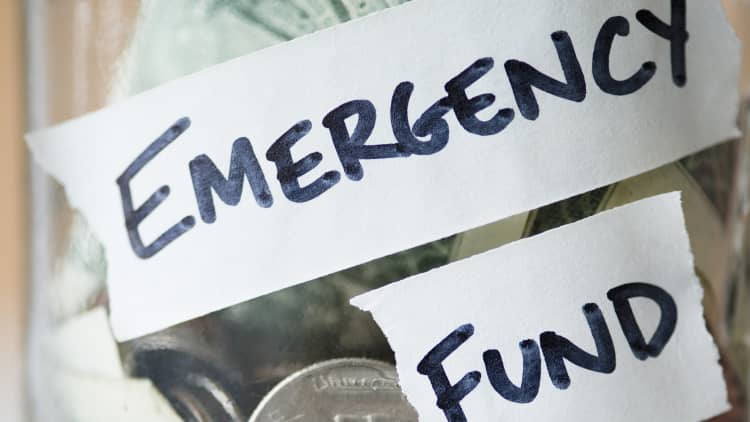Two-thirds of Americans plan to make financial New Year's resolutions this year. The top resolutions in Fidelity's annual survey of 3,000 Americans were, unsurprisingly, "save more" and "pay down debt."
But perhaps more should make this resolution instead: invest more.
Only about half of American families are participating in some way in the stock market, according to research from the St. Louis Fed. When it comes to millennials (ages 23 to 38), about 60% have no direct or indirect exposure to the stock market.
Investing in the stock market — which includes contributing to retirement accounts like 401(k)s, as well as taxable brokerage accounts — is typically one of the best ways to build long-term wealth. However, many people don't take this step because it feels overwhelming.
But it doesn't have to be. Start small by simply figuring out if you're in the best financial position to even do so. These three simple questions from financial experts will help first-time investors determine if they're ready to start getting into the stock market.
1. Why do you want to invest?
Before you open an investment account, financial experts say you need to think about the end goal for that money. "The goal determines the investment," says Scott Cole, a certified financial planner and founder of Alabama-based ColeFP and Wealth Management. "Too often, people just 'feel' they should be investing, but they don't know what they are trying to do and that aimlessness leads to poorer choices, no benchmarks and no strategy," Cole tells CNBC Make It.
Too often, people just 'feel' they should be investing, but they don't know what they are trying to do and that aimlessness leads to poorer choices, no benchmarks, and no strategy.Scott Colecertified financial planner
Think about what you're planning to use the money for and the timeline for that goal. For a 25-year-old contributing to a retirement account, a portfolio that's heavy in stocks may be totally appropriate. That's because even if there's a market downturn, younger investors have time to recover from the losses.
But a couple looking to buy a house in the next five years should probably not put all of their money into stocks. If the the market drops two years after the couple invests, they may lose a significant amount of the money they've earmarked for a down payment, putting their dream of owning a home within five years out of reach. Instead, financial planners suggest that if you have a short term goal, you should look for a more conservative investment such as bonds, or even keep the money in a high-yield savings account.
"Buying a bunch of stocks without a clear goal is like jumping in the car and driving without any idea of the destination," says Ron Guay, a financial planner with California-based Rivermark Wealth Management. "The goal doesn't have to be perfect or precise, but it's an important exercise that helps an investor connect their money to their goals and values."
2. What do your emergency savings look like?
The next question you should ask is whether you have enough cash on hand to start investing. While there are apps and services available that let you start with just $1, experts say you should first funnel some cash into an emergency savings fund.
That way, if you run into any issues, you have money on hand, rather than cashing out your investments or being forced to pay a penalty to access money saved in a retirement account. "Many investors jump right in and put their money immediately at risk," says Randy Gardner, an adjunct professor of financial planning at the American College of Financial Services and financial coach with the Garrett Planning Network of financial planners.

Ideally, you should have three to six months of living costs set aside, Gardner says. If you're married or in a committed relationship, you may be able to get away with three months of savings. But if you're single, Gardner recommends at least six months of savings because "you never know when you're going to be out a job or major car repair."
When to comes to where to stash your emergency savings, online banks can be a great option. The average interest rate among online banks was 1.69% in June, as opposed to an average of 0.28% offered by brick-and-mortar banks, according to the latest analysis of savings accounts conducted by DepositAccounts.com.
If you already have an emergency savings account and it's funded, then it's down to the last question.
3. What's your monthly budget?
In order to make regular, ongoing contributions to your investment accounts, financial planners say you'll first need to understand your income and expense flow.
That means figuring out your monthly budget. At the very least, you need to understand how much money, on average, you'll be able to funnel to your investment accounts every month. You can use budgeting tools like Mint or You Need a Budget (YNAB) to figure out how much you can save.
You can also factor in larger upcoming expenses to your budget calculations so they don't blow your investment plans off track. "At the beginning of the year, I like to get out the calendar and sketch out when big expenses are going to occur throughout the year," says Christina Empedocles, a CFP and founder of California-based Insight Personal Finance. This may include vacations, infrequent bills such as property taxes, or annual expenses like summer camp for the kids.
Empedocles says she creates automatic monthly transfers to help fund a dedicated savings account nicknamed 'Infrequent Expenses' so the money is pre-saved and ready to go when the bills are due.
Whether you create a detailed budget or simply do a rough calculation of your typical expenses, it's important to know how much you have leftover to invest. "The amount people save is going to be way more important than figuring out if Fund A or Fund B is better," says David Day, a CFP with Colorado-based Gold Medal Waters.
Once you've figured out your investment goals, your emergency savings is funded and you know how much you can contribute each month, experts say you'll be well-positioned to start investing.
Don't miss: Over half of Americans aren't taking this simple step to grow their wealth
Like this story? Subscribe to CNBC Make It on YouTube!



